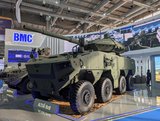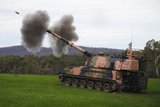Excalibur Ib enters low-rate initial production
Raytheon’s Increment Ib precision-guided projectile has entered low-rate initial production (LRIP) under a US Army contract announced on 20 February. The contract for the production of Excalibur Ib, worth $56.6 million, was issued in December 2012.
Excalibur - a co-development programme between Raytheon Company and BAE Systems/Bofors - is a 155mm precision-guided, extended-range projectile that uses GPS precision guidance to provide accurate, first round, fire-for-effect capability in any environment. According to Raytheon, Excalibur's precision provides a major reduction in the mission time, cost, logistical burden and risk of collateral damage when compared to alterative artillery rounds.
Lt. Col. Josh Walsh, the US Army Excalibur program manager, said: ‘The US Army and Raytheon team worked tirelessly to take Excalibur Ib from design to production in just a few years. The Excalibur Increment Ib round was designed to improve reliability and lower unit costs while maintaining its world class precision for our warfighters. With a radial miss distance of less than 4 meters at ranges in excess of 35km, Excalibur continues to provide manoeuvre commanders with an organic precision fires capability not seen before.’
Michelle Lohmeier, vice president of army programs at Raytheon Missile Systems, added: ‘The threats are constantly changing, and the way we counter them must also evolve and change. Excalibur Ib's design flexibility will allow software changes and capability improvements in response to future warfighter needs.’
Deliveries to the US Army are scheduled to begin in the last quarter of 2013. Future Excalibur Ib LRIP contract options through fiscal year 2016 include additional quantities to support US forces' increased inventory requirements, training allocations and military sales.
More from Land Warfare
-
![World Defense Show 2026: Large vehicles and counter-drone systems take the limelight]()
World Defense Show 2026: Large vehicles and counter-drone systems take the limelight
Visitors who attended the first World Defense Show four years ago continue to speak of the difficulties they faced with poor facilities and power problems. This year’s event emphasised its status as one of the major defence expositions and as a place where regional players and those less welcome at other shows could take centre stage.
-
![MKJ Warrior Series — The Nett Warrior Qualified Connector for Today’s Soldier Systems]()
MKJ Warrior Series — The Nett Warrior Qualified Connector for Today’s Soldier Systems
ITT Cannon’s MKJ Warrior connectors are designed for the harshest environments, delivering mission critical comms, navigation and USB data/power.
-
![Active vehicle protection comes to the forefront as Trophy and Iron Fist secure contracts]()
Active vehicle protection comes to the forefront as Trophy and Iron Fist secure contracts
Experience on the battlefield is accelerating the adoption of active protection systems as technologies continue to evolve to reflect shifting global defence needs.
-
![World Defense Show 2026: Hanwha increases Middle East presence and reveals Tigon 6x6 sale]()
World Defense Show 2026: Hanwha increases Middle East presence and reveals Tigon 6x6 sale
Shephard sat down with Hanwha Middle East and Africa president Sung Il at World Defense Show 2026 to hear about the company’s plans for the region and how it plans to use local industry success to win deals.
























